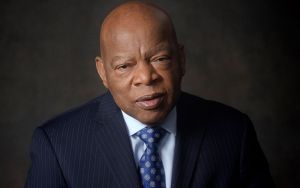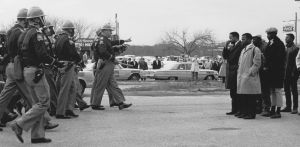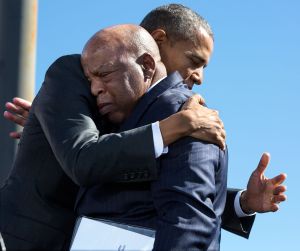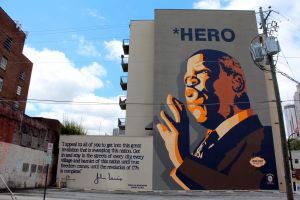John Lewis, icon of the Civil Rights Movement who was badly beaten on “Bloody Sunday,” has died after a six-month battle with pancreatic cancer. He was 80 years old.
CNN shared the family’s statement regarding his death.
“It is with inconsolable grief and enduring sadness that we announce the passing of U.S. Rep. John Lewis. He was honored and respected as the conscience of the US Congress and an icon of American history, but we knew him as a loving father and brother. He was a stalwart champion in the on-going struggle to demand respect for the dignity and worth of every human being. He dedicated his entire life to non-violent activism and was an outspoken advocate in the struggle for equal justice in America. He will be deeply missed.”

Bernice King, the daughter of Martin Luther King Jr., honored the Congressman on Twitter.
“”You did, indeed, fight the good fight and get into a lot of good trouble. You served God and humanity well. Thank you. Take your rest.”
Dr. King’s son, Martin Luther King III, followed.
“John Lewis was an American treasure. He gave a voice to the voiceless, and he reminded each of us that the most powerful nonviolent tool is the vote. Our hearts feel empty without our friend, but we find comfort knowing that he is free at last.”
Speaker of the House Nancy Pelosi released the following statement:
“Today, America mourns the loss of one of the greatest heroes of American history.
John Lewis was a titan of the civil rights movement whose goodness, faith and bravery transformed our nation – from the determination with which he met discrimination at lunch counters and on Freedom Rides, to the courage he showed as a young man facing down violence and death on Edmund Pettus Bridge, to the moral leadership he brought to the Congress for more than 30 years.
Every day of John Lewis’s life was dedicated to bringing freedom and justice to all. As he declared 57 years ago during the March on Washington, standing in the shadow of the Lincoln Memorial: ‘Our minds, souls, and hearts cannot rest until freedom and justice exist for all people.’ How fitting is it that even in the last weeks of his battle with cancer, John summoned the strength to visit the peaceful protests where the newest generation of Americans had poured into the streets to take up the unfinished work of racial justice. May his memory be an inspiration that moves us all to, in the face of injustice, make ‘good trouble, necessary trouble.’”
President Barack Obama honored the courage of his dear friend as well.
“In so many ways, John’s life was exceptional. But he never believed that what he did was more than any citizen of this country might do. He believed that in all of us, there exists the capacity for great courage, a longing to do what’s right, a willingness to love all people, and to extend to them their God-given rights to dignity and respect.”
John Robert Lewis, a son of sharecroppers, was born in Troy, Alabama in 1940. He took a series of nonviolent workshops while attending American Baptist College in Nashville, Tennessee. He participated in the iconic “Freedom Rides” in 1961 and became chairman of the Student Nonviolent Coordinating Committee two years later.

At 23 years old, Lewis was the youngest member to speak at the March on Washington, alongside Dr. King. He had sent Dr. King a letter after being denied the right to attend a specific school due to the color of his skin. Dr. King sent him a bus ticket to Montgomery, and upon entering Dr. King asked, “Are you the boy from Troy?” The two would go on to organize the March on Washington together.
On March 7, 1965, Lewis was badly beaten by an Alabama state trooper while marching for voting rights across the Edmund Pettus Bridge. The march became known as ‘Bloody Sunday,’ and the Congressman almost lost his life as he lay bloody and beaten on the ground. He once recalled that he “thought he saw death.”
In 1986, he was elected to Congress to represent Georgia’s 5th District. He would be re-elected 16 times and receive the John F. Kennedy Profile in Courage Award for Lifetime Achievement. President Barack Obama presented him with the Presidential Medal of Freedom in 2011.

He was arrested in Washington D.C. at the embassy of Sudan in 2009, while protesting the removal of aid workers working to keep the peace during the humanitarian crisis. Years later in 2016, he would lead a sit-in by Democrats in the House to protest the lack of action on gun violence. Just six months ago, he was diagnosed with stage four pancreatic cancer.
His unwavering call for equality, and unshakable faith in creating a more perfect union for all Americans, was uniquely complemented by a gentle touch and an undeniable laughter when causing “good trouble.”
As the Congressman once said:
“I got arrested 40 times during the 60s, five times since I’ve been in Congress, and I’m probably gonna get arrested again for something. My philosophy is very simple. When you see something that is not right, not fair, not just, you have a moral obligation to do something, to say something – to speak up and speak out.”

Lewis had spent the last month of his life organizing young people for summer demonstrations after the death of George Floyd. He visited the Black Lives Matter mural painted on the street in front of the White House, alongside D.C. Mayor Muriel Bowser.
Congressman John Lewis was a giant who showed all Americans the courage, humility and collective decency required to live out our true creed: that all people are created equal.
Let the courage and faith of a giant remain in the hearts and souls of Americans, along with the beauty of love and dignity so openly shared by “the boy from Troy.”


